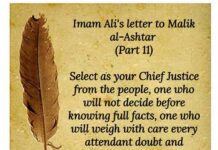Friday Sermon
In the name of Allah Who states “Muhammad is not the father of any of your men, but he is the Messenger of God and the Last of the Prophets”. Q33:40 Peace and blessings of Allah be upon His chosen servant, our master Muhammad and his purified progeny.
Let me start the week’s piece by sympathizing with Muslim – Ummah on the martyrdom of Imam Hasan al-Askary – the eleventh successor of the Prophet (s) – commiserated last Wednesday. It could be recalled that the Imam was martyred on similar day in the 260th year after hijra. In the same month on the 14th the prominent enemy of Allah and His Prophet Yazid, son of Mu’awiyah died in 64th year after hijra.
As we celebrate the birthday of this great Prophet, it is imperative to remind the world views of judicious Western scholars about him:
I. Sir George Bernard Shaw said in ‘The Genuine Islam,’ Vol. 1, No. 8, 1936.
“If any religion had the chance of ruling over England, nay Europe within the next hundred years, it could be Islam.” I have always held the religion of Muhammad in high estimation of its wonderful vitality. It is the only religion which appears to me to possess that assimilating capability to the changing phases of existence which can make itself appeal to everyone. I have prophesied about the faith of Muhammad that it would be acceptable to the Europe of today. The medieval ecclesiastics either through ignorance or bigotry painted Islam in the darkest colors. They were, in fact, trained to hate the man Muhammad and his religion. To them, Muhammad was anti – Christ. I have studied him -the wonderful man, and in my opinion, far from being an anti-Christ, he must be called the savior of humanity. I believe that if a man like him were to assume dictatorship of the modern world, he would succeed in solving its problems in a way that would bring the much needed peace and happiness. But to proceed, it was in the nineteenth century that honest thinkers like Carlyle, Gibbon and Goethe perceived intrinsic worth in the religion of Muhammad – already, even, at the present time many of our people have gone to his faith, and Islamization of Europe may be said to have begun”
II. Mahatma Gandhi, statement published in ‘Young India,’1924
“I wanted to know the best of the life of one who holds today an undisputed sway over the hearts of millions of mankind. I became more than ever convinced that it was not the sword that won a place for Islam in those days in the scheme of life. It was the rigid simplicity, the utter self-effacement of the Prophet, the scrupulous regard for pledges, his intense devotion to his friends and followers, his intrepidity, his fearlessness, his absolute trust in God and in his own mission. These and not the sword carried everything before them and surmounted every obstacle. When I closed the second volume (of the Prophet’s biography), I was sorry there was not more for me to read of that great life”.
III. Dr. Keith L. Moore Professor Emeritus, Department of Anatomy and Cell Biology. University of Toronto, Canada.
“It has been a great pleasure for me to clarify statements in the Qur’an about human development. It is clear to me that these statements must have come to Muhammad from God, because most of this knowledge was not discovered until many centuries later. This proves to me that Muhammad must have been a messenger of God”
IV. Edward Gibbon and Simon Oakley in ‘History of the Saracen Empire,’ London, 1870
“The greatest success of Mohammad’s life was effected by sheer moral force. It is not the propagation but the permanency of his religion that deserves our wonder, the same pure and perfect impression which he engraved at Mecca and Medina is preserved after the revolutions of twelve centuries by the Indian, the African and the Turkish proselytes of the Koran. The Mahomedans have uniformly withstood the temptation of reducing the object of their faith and devotion to a level with the senses and imagination of man. ‘I believe in One God and Mohamed the Apostle of God’ is the simple and invariable profession of Islam. The intellectual image of the Deity has never been degraded by any visible idol; the honors of the Prophet have never transgressed the measure of human virtue, and his living precepts have restrained the gratitude of his disciples within the bounds of reason and religion.”
V. Alphonse de La Martaine in ‘Historie de la Turquie,’ Paris, 1854.
…. “If greatness of purpose, smallness of means, and astonishing results are the three criteria of a human genius, who could dare compare any great man in history with Muhammad? The most famous men created arms, laws, and empires only. They founded, if anything at all, no more than material powers which often crumbled away before their eyes. This man moved not only armies, legislation, empires, peoples, dynasties, but millions of men in one-third of the then inhabited world; and more than that, he moved the altars, the gods, the religions, the ideas, the beliefs and the souls. On the basis of a Book, every letter which has become law, he created a spiritual nationality which blended together peoples of every tongue and race. He has left the indelible characteristic of this Muslim nationality the hatred of false gods and the passion for the One and Immaterial God. This avenging patriotism against the profanation of Heaven formed the virtue of the followers of Muhammad; the conquest of one-third the earth to the dogma was his miracle; or rather it was not the miracle of man but that of reason. The idea of the unity of God, proclaimed amidst the exhaustion of the fabulous theologies, was in itself such a miracle that upon it’s utterance from his lips it destroyed all the ancient temples of idols and set on fire one-third of the world. His life, his meditations, his heroic reveling against the superstitions of his country, and his boldness in defying the furies of idolatry, his firmness in enduring them for fifteen years in Mecca, his acceptance of the role of public scorn and almost of being a victim of his fellow countrymen. This dogma was twofold, the unity of God and the immateriality of God: the former telling what God is, the latter telling what God is not; the one overthrowing false gods with the sword, the other starting an idea with words. Philosopher, orator, Apostle, legislator, conqueror of ideas, restorer of rational beliefs, the founder of twenty terrestrial empires and of one spiritual empire that is Muhammad. As regards all standards by which human greatness may be measured, we may well ask, is there any man greater than he?”
VI. Michael Hart in ‘The 100, A Ranking of the Most Influential Persons In History,’ New York, 1978.
“My choice of Muhammad to lead the list of the world’s most influential persons may surprise some readers and may be questioned by others, but he was the only man in history who was supremely successful on both the secular and religious level. It is probable that the relative influence of Muhammad on Islam has been larger than the combined influence of Jesus Christ and St. Paul on Christianity. It is this unparalleled combination of secular and religious influence which I feel entitles Muhammad to be considered the most influential single figure in human history”.
VII. James Michener in ‘Islam: The Misunderstood Religion,’ Reader’s Digest, May 1955, pp. 68-70.
“No other religion in history spread so rapidly as Islam. The West has widely believed that this surge of religion was made possible by the sword. But no modern scholar accepts this idea, and the Qur’an is explicit in support of the freedom of conscience. Like almost every major prophet before him, Muhammad fought shy of serving as the transmitter of God’s word sensing his own inadequacy. But the Angel commanded ‘Read’. So far as we know, Muhammad was unable to read or write, but he began to dictate those inspired words which would soon revolutionize a large segment of the earth: “There is one God.” In all things Muhammad was profoundly practical. When his beloved son Ibrahim died, an eclipse occurred and rumors of God ‘s personal condolence quickly arose. Whereupon Muhammad is said to have announced, ‘An eclipse is a phenomenon of nature. It is foolish to attribute such things to the death or birth of a human being’. “At Muhammad’s own death an attempt was made to deify him, but the man who was to become his administrative successor killed the hysteria with one of the noblest speeches in religious history: ‘If there are any among you who worshiped Muhammad, he is dead. But if it is God you Worshiped, He lives forever’.”
VIII. Gibbon in ‘The Decline and Fall of the Roman Empire’ 1823
“The good sense of Muhammad despised the pomp of royalty. The Apostle of God submitted to the menial offices of the family; he kindled the fire; swept the floor; milked the ewes; and mended with his own hands his shoes and garments. Disdaining the penance and merit of a hermit, he observed without effort of vanity the abstemious diet of an Arab”.
IX. Rev. Bosworth Smith, Mohammed, and Mohammedanism, London 1874, p. 92:
“He was Caesar and Pope in one; but he was Pope without Pope’s pretensions, Caesar without the legions of Caesar: without a standing army, without a bodyguard, without a palace, without a fixed revenue; if ever any man had the right to say that he ruled by the right divine, it was Mohammed, for he had all the power without its instruments and without its supports.”
At this juncture, I call on all Muslims to reunite themselves in the interest of the religion, thank those working to actualize this goal and reiterate the incessant need for the unconditional release of Sheikh el-Zakzaky (H) who is in dire need of medical attention along with his disciples.
Wassalamu alaikum.
Follow the Neptune Prime channel on WhatsApp:
Do you have breaking news, interview request, opinion, suggestion, or want your event covered? Email us at neptuneprime2233@gmail.com





